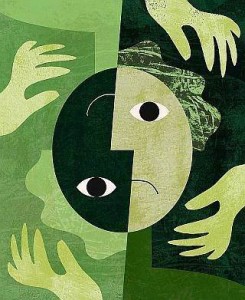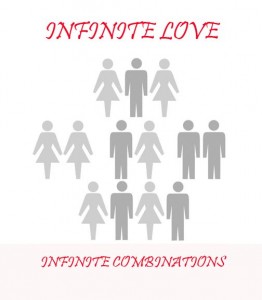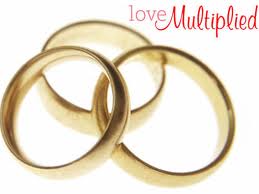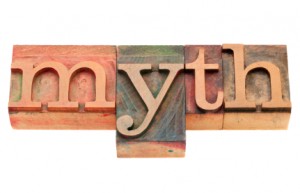 1. Myth: Polyamory will always be easy when you find the right person or persons.
1. Myth: Polyamory will always be easy when you find the right person or persons.
A poly relationship is like any relationship. Regardless of who you are with, it will always take time, effort and commitment. The more individuals in a polycule the more effort and commitment it will take to maintain it. If you think maintaining a monogamous relationship takes a little effort, a poly one takes even more.
2. Myth: Poly people are sex fiends or addicts, which means they are extremely promiscuous and unsafe.
Polyamorous means by definition many loves. It does not mean much sex. Now, if you love more than one person, does this mean you will have more sex? Yes, it could mean this, but it is not always true. Polyamorous people love more than one person. Poly is about love, and sex is a fringe benefit of love. If anything, poly people are love fiends or love addicts. Robert Heinlein wrote it eloquently: “The more you love, the more you can love–and the more intensely you love. Nor is there any limit on how many you can love. If a person had time enough, he could love all of that majority who are decent and just.”
Polyamory does not mean promiscuous or unsafe. There are plenty of promiscuous and unsafe monogamous people, who’ve spread diseases to others. In fact, many poly people today practice safe sex. Being promiscuous or practicing unsafe sex isn’t a aspect of poly but an aspect of the individual, whether they are poly or monogamous.
3. Myth: People become poly because they are damaged and/or have low self-esteem.
In order to be successful at poly, you must have a healthy self-esteem. Most poly people see their own value and love themselves before they seek partners. We’ve all heard the statement, “We must love ourselves before someone else can love us.” When we love our self first, we find inner fulfillment, and we also know what we need or want from others. Many polyamorous and monogamous people have an extremely healthy sense of self-esteem. Conversely, many polyamorous and monogamous people have a low sense of self esteem. Contradiction? Not at all when you realize that emotional or self esteem issues are not an aspect of polyamory or monogamy but, again, a reflection of the individual. People’s motivation, whether good or bad, for entering any type of relationship, whether monogamous or poly, is completely dependent upon them.
4. Myth: We will improve or fix the problems in our relationship by adding another 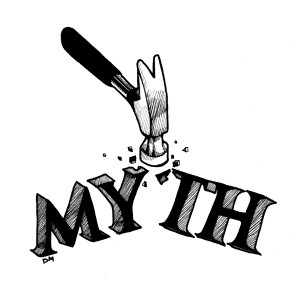 person to help enhance or fix it.
person to help enhance or fix it.
Actually, adding another person to a currently damaged or hurting relationship will only complicate matters more. Your relationship must be in a healthy state before you even begin thinking about adding another partner. This is not much different than monogamous couple with damaged relationships believing that having a baby will fix their relationship. Adding other partners will confound issues by adding jealousy, envy, and other issues that come with this new person. Additionally, the partner you are adding is a tool, a commodity, that you are using. If you were honest with them, do you think they would be happy because you only wanted to be with them to fix problems in your relationship? It is not fair to them or you.
5. Myth: Polyamory is easier than monogamy because in poly, more partners mean you have more help.
Although a benefit of polyamory is that you have more partners to help you and share all of the burdens, it also means you have more partners to create more burdens. Some things can be easier. Some things can be harder.
Partners not only bring in their love, but they bring their lives with them. Familial issues, debt and personal or emotional issues also come with your new partners. For people we love, their problems become your problems. Plus a new relationship creates new things to deal or cope with all by itself.
6. Myth: Finding a poly partner will be easy for us.
The fact remains that many people who desire to be poly never find a poly partner. Some people have an issue finding a monogamous mate and monogamy is actually considered the norm. Many people do not wish to be poly because they realize that many of their family and friends will have issue with it and may reject them. They also have issues with poly due to intense jealousy, religious belief, or their societal norm.
7. Myth: Since we’ve been poly and successful for many years, we can add another partner and be just as successful.
Being successful in your current poly relationship does NOT guarantee that you will remain successful in a new poly relationship when you add a new person to your current polycule. Your current polycule has a certain set dynamic, but once you add another partner, you change the current dynamic. This new person brings in new ideas, beliefs, wants, and desires, so they will change the current dynamic. It will take work and effort to make a new addition as successful as your current relationship.
8. Myth: We can always try poly out for a while and see if we like it. If not, we can always just end it.
The problem with trying poly out for a while and then ending it if we do not like it is that people are involved. No one should go into any relationship, whether mono or poly, acting so nonchalant towards other people as if they are disposable. People are not disposable, and we must remember everyone has feelings. It is one thing for all parties in a poly relationship to agree to a trial period, but it is quite different and wrong for two people to agree to try it on for size without the other party being in agreement. People are not commodities to be used and discarded if you don’t like them.
people are involved. No one should go into any relationship, whether mono or poly, acting so nonchalant towards other people as if they are disposable. People are not disposable, and we must remember everyone has feelings. It is one thing for all parties in a poly relationship to agree to a trial period, but it is quite different and wrong for two people to agree to try it on for size without the other party being in agreement. People are not commodities to be used and discarded if you don’t like them.
9. Myth: If I let my partner have another partner, he/she will love me more.
Why would this even be true? Does this partner love their partner based upon what they allow them to do or what they give them? Love should be based upon the emotion you feel for that one individual person, and not based upon what that one individual allows or does not allow. This thought process indicates a relationship that already has issues and people that think polyamory will fix it.
10. Myth: Poly only works if everyone lives together.
This is definitely not true. Some poly families all live in the same house, while others live in separate houses. Some prefer their own living space, while others need to be altogether. We’ve known poly families who have lived together and ones who have not, and both forms have worked. Some families start with living apart, and then, they decide they want to live together. Sometimes, they begin by living together, and later, decide they’d rather living in separate homes. Some people find they are happier having their own space, while others prefer not feeling alone.
11. Myth: Poly only works if everyone has their own home.
This is definitely not true. Some poly families all live in the same house, while others live in separate houses. Some prefer their own living space, while others need to be altogether. We’ve known poly families who have lived together and ones who have not, and both forms have worked. Some families start with living apart, and then, they decide they want to live together. Sometimes, they begin by living together, and later, decide they’d rather living in separate homes. Some people find they are happier having their own space, while others prefer not feeling alone.
12. There is only one true form of poly.
This is nonsense. A variety of forms exist: polyamory, polygamy, polygyny, polyandry, “V”, triad, quad, line, group marriage, open marriage, swingers, etc…
13. Myth: Anyone can be poly.
No, not anyone can be poly, just like not everyone can be monogamous or married. Many people are extremely jealous and cannot share their partner with another person. Some people cannot give an equal amount time, energy, love and commitment to more than one relationship.
14. Myth: Poly means no jealousy, or if you do feel jealous, it means you are not meant to  be poly.
be poly.
Poly doesn’t mean NO jealousy. It means you learn to live with it. It could also mean you learn to communicate with your partners your jealous feelings, and hopefully, they help you discover why you are feeling jealous. Once you learn why, hopefully, they can help you find ways to overcome this particular incident of jealousy.
If you are poly and you experience jealousy, this does not mean you are not meant to be poly or that you are bad at poly, it just means you are normal; you are human. Your jealousy could be an indicator that your partners are not meeting your needs, or you actually need some more time with one or all of them. See our article on Jealousy.
15. Myth: For a woman, adding another female partner means you’ll never feel lonely and you’ll always have companionship.
This can be true, but it is not always the truth. If both women work, you may have opposing work schedules. She may not even like the same things as you, or the two of you may not get along. When your other partner spends alone time with her, then you will be alone during that time. If you are in a “V” relationship, you and the other non-romantic partner may only be friends. Even if you are in a triad and the two of you do share an intimate relationship, there will still be times where you may feel lonely.
16. Myth: If I let my partner have another partner, it will ensure he/she will stay with me.
This is not true: allowing your partner the liberty of having another partner provides no insurance that he/she will stay with you and never leave you for the other person. Just like in monogamy, people get divorced, separated or leave one another for other people. Being poly does not make a person more or less ethical or moral.













